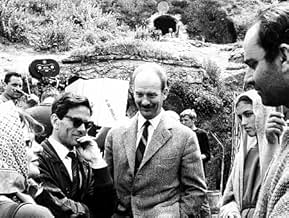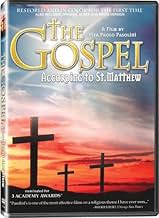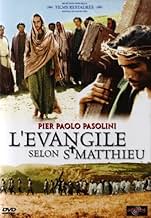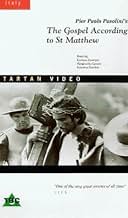VALUTAZIONE IMDb
7,6/10
14.585
LA TUA VALUTAZIONE
Segui la vita di Gesù Cristo secondo il Vangelo di Matteo.Segui la vita di Gesù Cristo secondo il Vangelo di Matteo.Segui la vita di Gesù Cristo secondo il Vangelo di Matteo.
- Regia
- Sceneggiatura
- Star
- Candidato a 3 Oscar
- 7 vittorie e 9 candidature totali
Juan Rodolfo Wilcock
- Caifa
- (as Rodolfo Wilcock)
Recensioni in evidenza
I must say, as a new IMDb user I find this place to express one views a rather welcome find. Cathartic to say the least. Certain films haunt me. "The Gospel According to St Matthew" is one of them. The only possible explanation is the passion of its maker. Everything about it is so real that I remember the first time I saw it, I felt I had met Jesus. My relationship with Jesus had been torturous at best. Raised catholic by very catholic pre- Vatican Council parents. So, part of my rebellion had always been underlined by moving away from that pathology as far away as possible. Pasolini however, a Marxist homosexual, showed me a human side of the man I was suppose to follow that made sense, that touched me. Enrique Irazoqui plays Jesus in a way that may explain everything. He is just a guy but in his eyes, in his eyes there is something I've never seen before. Compassion without fake undertones. It chilled me. I loved him. I wanted to follow him. Pasolini wasn't trying to sell me anything, he wasn't trying to convert anyone he was doing what an artist, a real artist does. He was sharing his vision with me, with us. When people talk about movie experiences, this is the film that comes to my mind first. I'm glad to have to opportunity to share this with you.
The Gospel According to St. Matthew (1964)
This is such a stately, respectful, yet contemporary (and dare I say, Italian) production, in quiet black and white, it's hard to find fault with it. In some ways, I think it does exactly what it intends. It mixes long shots with close ups. It moves with clarity and sharp (no dissolve) cuts from face to face. It uses African-American gospel and Bach. It depends on solemnity, and it uses actors that have the faces, and demeanors, to be utterly solemn and strong.
All the actors are amateurs. Pasolini was an atheist. The triumph at the end is a matter of record. It's all here.
The question might be (for some) whether it is nevertheless a movie you want to watch. And I say, absolutely. You do have to like, or learn to like, movies that are about quiet ambiance, about passive expressions that say more than intense extroverted acting. The black and white photography, something of a throwback during this early 1960s production, gives it even more of the timeless, almost melancholy depth that keeps it going, owing something to the Dreyer's Joan of Arc, I think.
It's important to know this is not really an interpretation of the gospel, but a reading of it. The filming of course required actors, but it tries to be factually straight forward. That's incredibly hard to pull off without arrogance or religiosity. But Pasolini does it. The down side to this is that it's slow, or even (no sacrilege here), boring. I mean, I read the book.
For me, what makes it terrific is not only how it is filmed (the camera-work and editing) and the faces (all those faces, with the camera still and focused on them), but the sense of reality here. The holiness is removed, but not the sacred seriousness. It makes it seem possible in a very real way. The people, the places, all of it is not historic, not in particular, but the effect, the mood, the force of it all is profound. Even for a non-believer. It's quite something to get swept into.
This is such a stately, respectful, yet contemporary (and dare I say, Italian) production, in quiet black and white, it's hard to find fault with it. In some ways, I think it does exactly what it intends. It mixes long shots with close ups. It moves with clarity and sharp (no dissolve) cuts from face to face. It uses African-American gospel and Bach. It depends on solemnity, and it uses actors that have the faces, and demeanors, to be utterly solemn and strong.
All the actors are amateurs. Pasolini was an atheist. The triumph at the end is a matter of record. It's all here.
The question might be (for some) whether it is nevertheless a movie you want to watch. And I say, absolutely. You do have to like, or learn to like, movies that are about quiet ambiance, about passive expressions that say more than intense extroverted acting. The black and white photography, something of a throwback during this early 1960s production, gives it even more of the timeless, almost melancholy depth that keeps it going, owing something to the Dreyer's Joan of Arc, I think.
It's important to know this is not really an interpretation of the gospel, but a reading of it. The filming of course required actors, but it tries to be factually straight forward. That's incredibly hard to pull off without arrogance or religiosity. But Pasolini does it. The down side to this is that it's slow, or even (no sacrilege here), boring. I mean, I read the book.
For me, what makes it terrific is not only how it is filmed (the camera-work and editing) and the faces (all those faces, with the camera still and focused on them), but the sense of reality here. The holiness is removed, but not the sacred seriousness. It makes it seem possible in a very real way. The people, the places, all of it is not historic, not in particular, but the effect, the mood, the force of it all is profound. Even for a non-believer. It's quite something to get swept into.
After "La Ricotta", Pasolini was indicted by the church for blasphemy. The film apparently contained references to Homosexuality (it does). He was convicted and given a suspended sentence. So when it was announced that his next feature was "The Gospel According to St. Matthew," you can guess what the church's response was. Pasolini made the film anyway. The result is one of the most exciting examples of Pasolini's "Cinema of Poetry". I have read many comments about this film that criticize it for its elipses, bad acting and apparent lack of visual prowness. I will attest to you, though, that this film not only creates an honest 20th century portrait of Jesus but also dives deeply into Pasolini's masterful art of filmmaking. Pasolini was way ahead of his time like many other Italian filmmakers of the sixites. The supposed bad acting, elipses and visuals in the film were all done on purpose. They aren't bad. In fact, thay force a patient viewer to look deeply into the minds and thoughts of the characters surrounding Jesus. The Gospel has been told many ways, but no one ever dared to tell the story on a personal level. Pasolini invites the viewer to experience the Gospel in a differnt way. With a wonderful mix of religious music (American, Brazilian, etc.), the film reaches out to the entire Christian world. I can go on and on about the other wonders this film has to offer, but instead I'll just recommend you watch it. When you do, don't pay attention to what's missing, but to what is there on screen. The film will make a lot more sense. Even for non-believers (myself included), this is an exciting film.
For sure, the Christ of Il vangelo secondo Matteo is the most exceptional one ever to be depicted in cinema - a brilliant poetic fiction which brings it back to the pure level of words and gestures and displays the amazement and enthusiasm of the view of a privileged witness such as St. Matthew. A hard, implacable Christ, gentle to children and furious at salesmen, vehement against hypocrites, scribes and humbugs, unrelenting in his faith. He preaches the most difficult revolution given, the inner revolution of behaviour and its resulting decisions. The people that he is confronted with are sort of an Eisenstein'ian choir of faces in closeups with absent-minded or bright looks and ambiguous smiles of those who don't really understand. In this regard, it's actually a Pasolini'an choir of a mute mob witnessing happenings they feel subordinate to, a choir of anonymous figures, who suffer but not fight and who still dedicate themselves to a hope which becomes more and more unreachable.
Jesus and his 12 followers are a group of involved young men, who champion for revolutionary concerns. The youth and inexperience of the actors gives a fascinating sense of the fragility of the Christian movement itself in its very beginnings. The iconic-like closeups are a reminiscent of medieval, religious pictures whereas Enrique Irazoqui, who plays Jesus, seems like as if he descended right from a El Greco painting with his thin figure and slim, long face. The music from Bach and Mozart, as well as Blues recordings conveys additional meaning: The cry of revolt and the demand to be heard and received by the people and its authorities. It becomes utterly touching when the film dissolves into melancholy and passion by the power of Bach's classical music chorus and the blues.
The cinematography is remarkable and takes in many scenes the position of a third person telling the story. The intensely textual and dramaturgic reference to the biblical model, the amateurish performances of the actors and the waive of any pathos gives the film a strong naturalistic nuance. Jesus is less the son of god, but more an ideological fighter who gives radical speeches. But, Pasolini does not demystify the figure of Christ, nor does he question the set dogmas of the official church. He rather accentuates the social facets of Jesus' life and work and gives it an unforeseen political smack
Jesus and his 12 followers are a group of involved young men, who champion for revolutionary concerns. The youth and inexperience of the actors gives a fascinating sense of the fragility of the Christian movement itself in its very beginnings. The iconic-like closeups are a reminiscent of medieval, religious pictures whereas Enrique Irazoqui, who plays Jesus, seems like as if he descended right from a El Greco painting with his thin figure and slim, long face. The music from Bach and Mozart, as well as Blues recordings conveys additional meaning: The cry of revolt and the demand to be heard and received by the people and its authorities. It becomes utterly touching when the film dissolves into melancholy and passion by the power of Bach's classical music chorus and the blues.
The cinematography is remarkable and takes in many scenes the position of a third person telling the story. The intensely textual and dramaturgic reference to the biblical model, the amateurish performances of the actors and the waive of any pathos gives the film a strong naturalistic nuance. Jesus is less the son of god, but more an ideological fighter who gives radical speeches. But, Pasolini does not demystify the figure of Christ, nor does he question the set dogmas of the official church. He rather accentuates the social facets of Jesus' life and work and gives it an unforeseen political smack
Rendering Bible stories into film is a difficult task, but Pasolini's account of Matthew's Gospel is among the most successful. The narration of events in the Bible is generally quite sparse, with only the most salient details given; as a result, events are fraught with hidden depths and profundity. Medieval art gives a similar effect, using completely different techniques. Filmmakers of the Bible generally attempt to flesh out the stories to make them more "real," but the result is inevitably banal and overwrought at the same time. Pasolini uses a different approach. First of all, he adds almost nothing to the text of Matthew's Gospel, and all the dialogue and events are directly from Matthew. Next, it's filmed in black & white, and the acting, especially Jesus, is consistently understated. Many quiet shots of faces watching, reacting, or, in the case of Jesus, talking. In these ways, Pasolini succeeds, to some degree, in reproducing the effect of depth and transcendence found in the Bible. The music (from Bach, Blind Willie Johnson, and others) adds considerably to the power of the movie.
Pasolini's minimalist Jesus has an air of both humility and loftiness (as befitting one able to walk on water), but he is conspicuously lacking in emotion and expression. One might reply that Jesus (as God) doesn't share all our roller coaster emotions, but I see the New Testament Jesus as more of a Hamlet character, full of contradictory emotions. Pasolini's Jesus character's foreboding presentation could almost be seen as that of a young, conceited, dour, nihilistic Sophomore Philosophy student. A few quibbles: the Bible text describes large crowds of people following Jesus, but the movie only allows for a couple of dozen in most scenes. Also, in the movie, Jesus is often represented as preaching while he is walking, with his back turned away from his followers, who walk behind him. Finally, Mary the mother of Jesus is at most 20 when he is born, but she somehow becomes 70 years old during his ministry, when in fact she would have been only 50. With these reservations, then, I consider this the most successful Bible film I've seen.
Pasolini's minimalist Jesus has an air of both humility and loftiness (as befitting one able to walk on water), but he is conspicuously lacking in emotion and expression. One might reply that Jesus (as God) doesn't share all our roller coaster emotions, but I see the New Testament Jesus as more of a Hamlet character, full of contradictory emotions. Pasolini's Jesus character's foreboding presentation could almost be seen as that of a young, conceited, dour, nihilistic Sophomore Philosophy student. A few quibbles: the Bible text describes large crowds of people following Jesus, but the movie only allows for a couple of dozen in most scenes. Also, in the movie, Jesus is often represented as preaching while he is walking, with his back turned away from his followers, who walk behind him. Finally, Mary the mother of Jesus is at most 20 when he is born, but she somehow becomes 70 years old during his ministry, when in fact she would have been only 50. With these reservations, then, I consider this the most successful Bible film I've seen.
Lo sapevi?
- QuizPier Paolo Pasolini used non-professional actors and cast local peasants, shopkeepers, factory workers, and truck drivers. For Mary at the time of the Crucifixion, he cast his own mother Susanna Pasolini.
- BlooperWhen they are taking Christ down from the cross, in the distance you can see a car driving around a corner.
- Citazioni
[last lines]
Christ: All authority has been given to me in heaven and earth. Go, therefore. And make disciples of all nations, baptizing them in the name of the Father, and of the Son and the Holy Ghost, teaching them to observe everything I have commanded you. And behold. I am with you always even unto the end of the world.
- Versioni alternativeThe 2007 DVD release features a colorized, English-dubbed version with a run time of 91 minutes and an Italian-language black and white version running 136 minutes.
- ConnessioniEdited into Histoire(s) du cinéma: Une histoire seule (1989)
- Colonne sonoreMatthäus Passion (BWV 244)
Written by Johann Sebastian Bach
nr 78: Wir setzen uns mit Tränen nieder
nr 47: Erbarme Dich (musical intro)
I più visti
Accedi per valutare e creare un elenco di titoli salvati per ottenere consigli personalizzati
- How long is The Gospel According to St. Matthew?Powered by Alexa
Dettagli
- Data di uscita
- Paesi di origine
- Lingua
- Celebre anche come
- El Evangelio según san Mateo
- Luoghi delle riprese
- Castel Lagopesole, Avigliano, Basilicata, Italia(Sanhedrin trial of Jesus, in castle's courtyard)
- Aziende produttrici
- Vedi altri crediti dell’azienda su IMDbPro
Botteghino
- Lordo in tutto il mondo
- 16.572 USD
- Tempo di esecuzione2 ore 17 minuti
- Colore
- Mix di suoni
- Proporzioni
- 1.85 : 1
Contribuisci a questa pagina
Suggerisci una modifica o aggiungi i contenuti mancanti

























